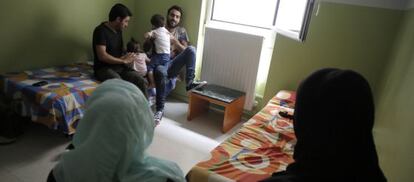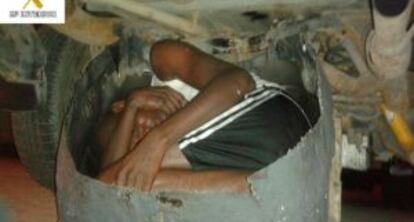Why Spain is just a stop on the road to Germany for most refugees
Many asylum seekers try to move north after their six months of Spanish aid ends

Munich, Hamburg, Berlin... German cities are the professed goal of a group of Syrians who have found their way to a small hostel in the outskirts of Madrid. But this is just a transit area. As soon as they accumulate enough money – and strength – these refugees are planning to continue their journey to Germany.
Every week, refugees who have arrived in Spain are leaving for northern Europe.
While politicians wrangle over refugee admission figures, down at street level, national quotas are almost irrelevant: necessity is what really rules.
I am desperate, I’m going to go crazy”
Refugee Abed Abu Al Sayed
Many of those who reach Spain leave as soon as they can for countries with more generous aid. They know there are no jobs here, and that the existing structure cannot cover everyone’s needs. The extensive family networks they already have in place in northern Europe take care of the rest.
That is why, while German and Swedish cities are deploying military camps to take in all the newcomers, Spain is to a certain degree removed from the world’s greatest refugee exodus since World War II.
One of the youths sitting around on the sofas at the Madrid hostel is Hakim, 24. He was due to graduate from dentistry school in two years but got conscripted. Hakim didn’t want to become part of Bashar al-Assad’s bloody army, so he deserted. The next step was necessarily to flee the country. He invested his savings in crossing northern Africa to reach Morocco.
Sweden mobilizes hotels, military barracks and apartments
Almost since the beginning of the Syrian war four years ago, Sweden realized that the conflict would result in millions of refugees, as indeed has been the case.
Since then, the country has launched a complex logistical operation to take in those fleeing the conflict. Around 74,000 claims are expected this year.
The government is using hotels, military barracks, shared apartments and generally any livable space to house the refugees.
Asylum seekers also receive around €250 a month per adult and a little less per child, and the benefits last until the refugees obtain their residency papers.
After that, they are taken to state-owned or subsidized housing where they receive personalized assistance to help them find a job. They also receive intensive language courses and other types of aid.
The process can last nearly two years, until the newcomers are able to fend for themselves, explains a spokeswoman for the Swedish migration agency.
Hakim swam from the Moroccan town of Castillejos to the Spanish exclave of Ceuta, while his wife paid €2,000 to be carried across under a car. From there they were taken to Seville, where their child received hospital treatment as he was very ill.
After that, the family was taken to a refugee center, where they remained for six months in accordance with Spanish legislation, receiving €50 a month in spending money. When the time ran out, Hakim and his family found themselves on the street, where they have been surviving on whatever his relatives can send him.
“I have nothing, not even to pay the hostel,” he says. “Why doesn’t Spain help the refugees?” His next travel plans are clear: “Germany, inshallah.”
Abed Abu Al Sayed, a 51-year-old Palestinian from Nablus, is another refugee who has ended up on the streets. “I am desperate, I’m going to go crazy,” says Al Sayed, who sleeps on a bed made of cardboard sheets. His wife and children arrived after him and are still at a refugee center. He says he can no longer stay there because his six months are up.
“What’s going to happen to my children when their six months are out? I came here to give them a decent life in Spain.”
The Spanish reception system is overwhelmed, according to organizations that work with refugees. Spain has been unable to adapt to the rise in claims over the last few years as a result of the war in Syria, nor to the new types of refugee coming in, individuals who are often traumatized and speak no Spanish.
The surge in asylum claims – 6,202 so far this year, more than in the whole of 2014, according to the Interior Ministry – did not see a matching rise in funding. As a result, there are increasingly fewer resources for each refugee. The United Nations refugee agency, Acnur, recently considered that “both the duration of the programs and the service infrastructure, including the CETIS [holding centers] in Ceuta and Melilla, are not providing an adequate response [...] and exposing many people to situations of risk and exclusion.”
Yet sources at the Labor Ministry praise the system and say that more beds are now available, although no figures have been provided. Even so, the same sources admit that “the pace of the administration is not quite as fast as we would like it to be,” and that smaller budgets caused partly by the 2012 cuts have forced authorities to “give priority to the most vulnerable.”
“Spain began adapting and resizing last year,” added the same sources. The ministry is contemplating a 449.9-percent fund increase by 2016, for a total of €53.08 million.
The Spanish Committee for Refugee Aid, Cear, explains that asylum seekers used to spend between nine and 12 months at reception centers, but now rarely stay more than six. Before the crisis, many of them left before their deadline expired after finding jobs in construction. But that has changed radically.
“In six months it is practically impossible to learn a language and find a job, especially for traumatized people,” notes Cear secretary general Estrella Galán.
To the new arrivals must be added those who return. The Dublin Regulation determines that refugees must settle down in the first EU country they enter. This year alone, Spain has received 2,686 requests to take back refugees under the Dublin rule.

“There has been a great increase in people returning to Spain because of Dublin,” says José Javier Sánchez, the Red Cross deputy director for migration. Sánchez says the charity’s own centers will double their capacity in the next few weeks, when they receive a new pending subsidy.
Countries such as Germany and Sweden, which are in great demand by refugees, are adamant that integration is key. The state has an interest in seeing them learn the language and find a job as soon as possible, because it benefits nobody to prolong the situation of dependence or create pockets of marginalization. These governments are also aware that they need the labor provided by the refugees.
But this kind of common sense is still far off for the refugees trapped on Spanish soil, between four bare hotel walls where they dream of reaching German territory as soon as possible.
English version by Susana Urra.
Tu suscripción se está usando en otro dispositivo
¿Quieres añadir otro usuario a tu suscripción?
Si continúas leyendo en este dispositivo, no se podrá leer en el otro.
FlechaTu suscripción se está usando en otro dispositivo y solo puedes acceder a EL PAÍS desde un dispositivo a la vez.
Si quieres compartir tu cuenta, cambia tu suscripción a la modalidad Premium, así podrás añadir otro usuario. Cada uno accederá con su propia cuenta de email, lo que os permitirá personalizar vuestra experiencia en EL PAÍS.
En el caso de no saber quién está usando tu cuenta, te recomendamos cambiar tu contraseña aquí.
Si decides continuar compartiendo tu cuenta, este mensaje se mostrará en tu dispositivo y en el de la otra persona que está usando tu cuenta de forma indefinida, afectando a tu experiencia de lectura. Puedes consultar aquí los términos y condiciones de la suscripción digital.









































